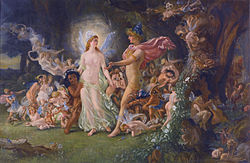A Midsummer Night's Dream (Britten)
| Work data | |
|---|---|
| Title: | A midsummer night's dream |
| Original title: | A Midsummer Night's Dream |
| Original language: | English |
| Music: | Benjamin Britten |
| Libretto : | Benjamin Britten and Peter Pears after William Shakespeare |
| Premiere: | June 11, 1960 |
| Place of premiere: | Aldeburgh (Jubilee Hall) |
| Playing time: | approx. 2 hours and 40 minutes |
| Place and time of the action: | Athens and near forest, legend time |
| people | |
|
|
A Midsummer Night's Dream (English: A Midsummer Night's Dream ) is an opera in three acts by Benjamin Britten after the eponymous drama by William Shakespeare . It premiered at the Aldeburgh Festival in 1960 .
action
first act
The setting is Athens and a nearby forest at the time of the legend . There is a family quarrel in the realm of the elves . The ruling couple Oberon and Titania fell out over a human boy. Oberon instructs the goblin Puck to drip a magic substance in his wife's eyes, which will make her fall in love with the first creature she meets. In this way he wants to make her compliant. At the same time, two young couples who were forbidden to marry fled to the forest near Athens: Lysander and Hermia as well as Demetrius and Helena. Helena is Hermia's friend - and now her rival for Demetrius' favor. Because Helena still loves Demetrius, who once returned her love, but then inflamed for Hermia, who is to marry him at her father's behest. According to Oberon's will, Demetrius should also be instilled with the love potion so that he can rediscover his feelings for Helena. But Puck makes a serious mistake: Instead of giving Demetrius the drink, Lysander falls in love with Helena. Unaffected by these events, six craftsmen rehearse in the forest the comic tragedy of Pyramus and Thisbe , which they want to perform on the occasion of Duke Theseus' wedding .
Second act
During a craftsman's rehearsal, Puck turns the weaver slip into a donkey. His comrades flee, but Titania falls under the influence of the magic potion with a glowing passion for the animal. Meanwhile, jealousy scenes occur among the young people. Oberon can just barely prevent the use of violence by confusing them and separating them from each other.
Third act
At dawn, Oberon keeps things tidy. First he gives the slip back his human form. When the young people wake up, they mistake the previous events for bad dreams and find each other. Oberon and his wife Titania are reconciled. At Theseus' wedding party everyone enjoys the acting of the craftsmen who put on the play Pyramus and Thisbe . Theseus gives his blessing to the two couples present, Lysander and Hermia on the one hand and Demetrius and Helena on the other hand, who have now come together in the "correct" constellations after all the confusions.
Remarks
This fairy tale opera is one of Benjamin Britten's most successful pieces. William Shakespeare's original text was shortened from five to three acts, but the wording was hardly changed. Characteristic of the work are the unusual voices in the line-up: countertenor for Oberon, coloratura soprano for Titania. The rustic theatrical performance of the craftsmen in the third act is an artful parody of the genre of Italian opera. The unrealistic musical design of the Elfenwelt with harps , celesta and harpsichord is impressive .
Web links
- A Midsummer Night's Dream at the Britten-Pears Foundation
- Dirk Ulrich Kaufmann: Calendar sheet for the day of the premiere (Deutsche Welle)
- Plot of A Midsummer Night's Dream (Britten) on Opera-Guide landing page due to URL change currently not available
- Work data for A Midsummer Night's Dream based on MGG with discography at Operone
